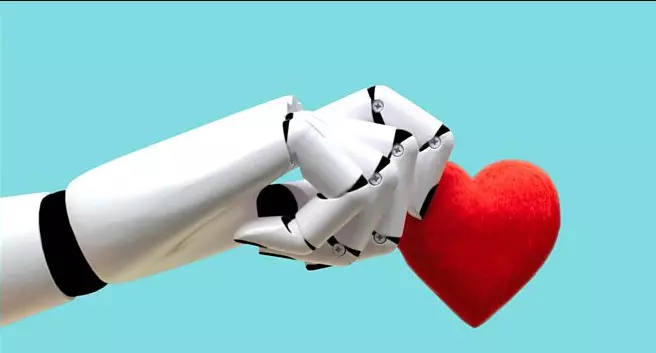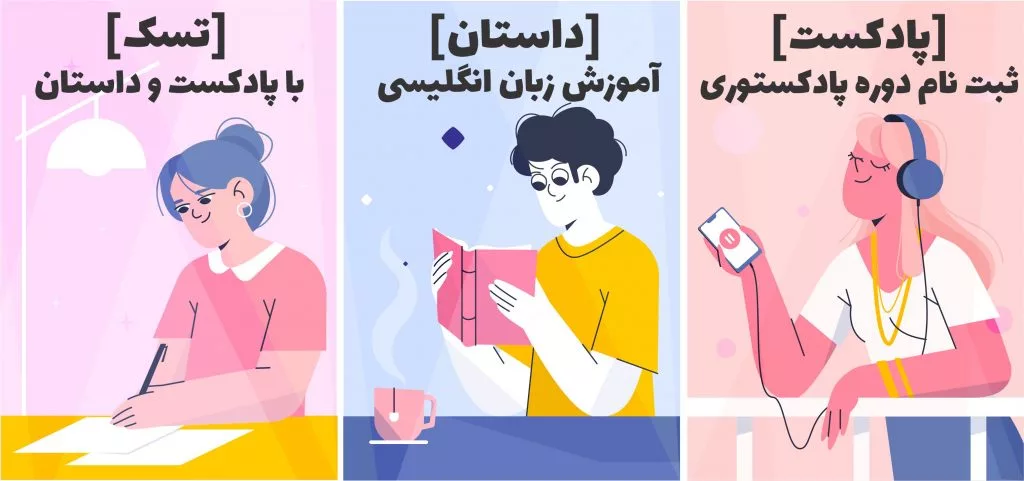پادکست انگلیسی BBC – دنیای ربات ها
ربات ها می توانند کارهای بسیاری انجام دهند و حالا یک کار دیگر به قابلیت هایشان اضافه شده است: خدمات اجتماعی! ربات هایی که برای انجام خدمات اجتماعی طراحی شدند وظیفه ی مراقبت از بیماران و افراد سالمند را دارند. اما آیا به نظر شما ربات ها می توانند همذات پنداری کنند؟ در پادکست انگلیسی BBC – دنیای ربات ها درباره ی نکات مثبت و منفی این داستان خواهید شنید و کلمات کاربردی جدیدی در این زمینه یاد می گیرید.
سوال پادکست انگلیسی BBC – دنیای ربات ها :
In which year was the first commercial robot built? Was it…
a) 1944
b) 1954, or
c) 1964
به پادکست خوب گوش کن تا جواب رو پیدا کنی.
اگر می خوای گوش دادن به پادکست تا حد امکان برات ساده و کارآمد باشه مراحل زیر را دنبال کن:
هر روز به پادکست گوش کن. وقتی براش یه وقت ثابت در روز در نظر بگیری برات تبدیل به عادت میشه و این عادت هرروز پیشرفت میکنه.
پادکستی رو پیدا کن که موضوعش برات جالب باشه. وقتی از خود موضوع لذت ببری یادگیری هم برات لذتبخش میشه.
به پادکستی گوش کن که transcript یا متن داره. این بهت کمک می کنه تا کلمات و عبارات جدید رو به سرعت در متن پیدا کنی و ساختار انواع مختلف جمله رو خوب یاد بگیری.
پس از گوش دادن به پادکست با متن، در مرحله بعدی سعی کن بدون نگاه کردن به متن این کار رو انجام بدی. این کار مهارت شنیداری رو تقویت می کنه و کمک می کنه تا انگلیسی زبانان بومی را راحت تر درک کنی، حتی اگر خیلی سریع صحبت کنن.
اگه به پادکست انگلیسی گوش کردی و نتونستی کامل متوجه اش بشی، ناامید نشو. پادکست هایESL -English as Second Language بیشماری وجود دارن که برای سطوح مختلف، از ابتدایی تا پیشرفته طراحی شدن. مطمئنا هر روز می تونین یه پادکست مناسب با سطح خودت پیدا کنی.
فراموش نکن که هرچی بیشتر تمرین کنی در اون مهارت رشد میکنی! به قول انگلیسی ها: Practice makes perfect
واژگان کلیدی پادکست انگلیسی BBC - دنیای ربات ها
| معنی به فارسی | معنی به انگلیسی | واژه |
| همذات پنداری | the ability to understand how someone feels by imagining what it would be like to be in that person’s situation | empathy |
| یاری رسان فیزیکی | describes helping someone by touching or feeling them | physical assistance |
| همراه | someone who is with you and keeps you company | companion |
| بودجه محدود | (in the context of money) there is not enough | tight |
| متروک | left alone in a place, usually forever | abandoned |
| اخلاقیات | the study of what is morally right | ethics |
?BBC 6 minute English - Can robots care for us

پادکست انگلیسی BBC - دنیای ربات ها
Note: This is not a word-for-word transcript
Rob
Hello. This is 6 Minute English. I’m Rob. And joining me to do this is Sam
Sam
Hello.
Rob
In this programme, we’re talking about robots. Robots can perform many tasks, but they’re now being introduced in social care to operate as carers, to look after the sick and elderly. We’ll be discussing the positive and negative issues around this but first, let’s set you a question to answer, Sam. Are you ready for this
Sam
Fire away.
Rob
Do you know in which year was the first commercial robot built? Was it in…
a) 1944
b) 1954, or
?c) 1964
Sam
They’re not a brand new invention, so I’ll go for 1954
Rob
OK, we’ll I’ll tell you if you’re right or wrong, at the end of the programme. So, let’s talk more about robots, and specifically ones that are designed to care for people. Traditionally, it’s humans working as nurses or carers who take care of elderly people – those people who are too old or too unwell to look after themselves
Sam
But finding enough carers to look after people is a problem – there are more people needing care than there are people who can help. And recently in the UK, the government announced a £۳۴ million fund to help develop robots to look after us in our later years
Rob
Well, robot carers are being developed but can they really learn enough empathy to take care of the elderly and unwell? Empathy is the ability to understand how someone feels by imagining what it would be like to be in that person’s situation
Sam
Well, let’s hear about one of these new robots now, called Pepper. Abbey Hearn-Nagaf is a research assistant at the University of Bedfordshire. She spoke to BBC Radio 4’s You and Yours programme and explained how Pepper is first introduced to someone in a care home
Abbey Hearn-Nagaf, research assistant, University of Bedfordshire
We just bring the robot to their room. And we talk about what Pepper can’t do, which is important so we can’t provide physical assistance in any way. It does have hands, it can wave… when you ask for privacy, it does turn around and sort of cover its eyes with its hands but that’s the most it does. It doesn’t grip anything, it doesn’t move anything because we’re more interested to see how it works as a companion – having something there to talk to, to converse with, to interact with
Rob
So, Abbey described how the robot is introduced to someone.
Sam
She was keen to point out that this robot has limitations – things it can’t do. It can wave or turn round when a person needs privacy – to be private – but it can’t provide physical assistance. This means it can’t help someone by touching or feeling them
Rob
But that’s OK, Abbey says. This robot is designed to be a companion – someone who is with you to keep you company – a friend in other words that you can converse or talk with
Sam
Well, having a companion is a good way to stop people getting lonely, but surely a human is better for that – surely they understand you better than a robot ever can
Rob
Well, innovation means that robots are becoming cleverer all the time. And as we’ve mentioned, in the UK alone there is a growing elderly population and more than 100,000 care assistant vacancies. Who is going to do all the work
Sam
I think we should hear from Dr Sarah Woodin, a health researcher in independent living from Leeds University, who also spoke to the BBC’s You and Yours programme. She seems more realistic about the introduction of robot carers
Dr Sarah Woodin, Leeds University
I think there are problems if we consider robots as replacement for people. We know that money is tight – if robots become mass-produced there could be large institutions where people might be housed and abandoned to robots … I do think questions of ethics need to come into the growth and jobs agenda as well because sometimes they’re treated very separately
Rob
OK, so Sarah Woodin suggests that when money is tight – meaning there is only just enough – making robots in large quantities – or mass-produced – might be a cheaper option than using humans. And she says people might be abandoned to robots
Sam
Yes, abandoned means left alone in a place, usually forever. So she says it might be possible that someone ends up being forgotten and only having a robot to care for them. So is this right, ethically
Rob
Yes well, she mentions ethics – that’s what is morally right – and that needs to be considered as part of the jobs agenda. So, we shouldn’t just consider what jobs vacancies need filling but who and how it should be done. And earlier I asked you, Sam, did you know in which year was the first commercial robot built? And you said
Sam
I said 1954
Rob
Well you didn’t need a robot to help you there because you are right. Well done
Sam
Now let’s do something a robot can’t do yet, and that’s recap the vocabulary we’ve highlighted today, starting with empathy
Rob
Empathy is the ability to understand how someone feels by imagining what it would be like to be in that person’s situation
Sam
Physical assistance describes helping someone by touching them
Rob
We also mention a companion – that’s someone who is with you and keeps you company
Sam
Our next word was tight – in the context of money, when money is tight it means there is not enough
Rob
Abandoned means left alone in a place, usually forever
Sam
And finally, we discussed the word ethics – we hear a lot about business ethics or medical ethics – and it means the study of what is morally right
Rob
OK, thank you, Sam. Well, we’ve managed to get through 6 Minute English without the aid of a robot. That’s all for now but please join us again soon. Goodbye
Sam
Bye bye everyone!
امیدوارم از پادکست انگلیسی BBC - دنیای ربات ها لذت برده باشید.
گوش دادن به پادکست روش خوبی برای تقویت مهارت شنیداری و هم چنین یادگرفتن کلمات در بستر یک موضوع خاصه که این به تقویت مهارت مکالمه انگلیسی نیز کمک زیادی می کنه.
اگه تو هم از اون آدمهایی هستی که از گوش دادن به پادکست لذت می بره برات یه خبر خوب دارم! آموزشگاه آموزش زبان انگلیسی 24talk یه دوره طراحی کرده مبتنی بر پادکست و داستان کوتاه به اسم "پادکستوری - Podcastory". این دوره سعی کرده یادگیری زبان انگلیسی رو مناسب با نیاز و سطح زبان آموز به یه فرایند بسیار مفرح، موثر، سریع و کم هزینه تبدیل کنه.
همین الان می تونی با کلیک روی عکس زیر و ثبت نام در دوره ی آموزش زبان انگلیسی با پادکست و داستان ۲۴talk اولین و مهم ترین قدم رو برای یادگیری زبان انگلیسی برداری. وقت رو از دست نده!








